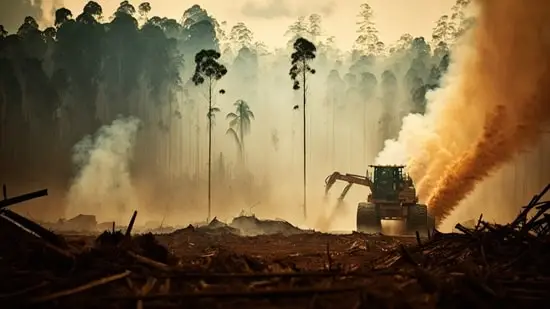Can you believe that cutting down huge areas or chunks of wood is what deforestation actually means? Indeed, the main reason for this is to make room for farms, urban sprawl, or just to get wood and other useful materials. Imagine taking an area that was full of lush plants and removing all of them. Simply put, by doing so, we are going against nature, and that’s not a good thing at all.
Advantages of Deforestation

1. Sure, Making The Economy Grow Faster
Can you believe that deforestation could actually stimulate and make the economy grow even faster? Here’s the thing you see, cutting down trees makes a lot of raw materials, like wood, available, you know? Now, wood isn’t just used to make cozy log houses; it’s also needed to make furniture, paper, and even big building projects. And it must be kept in mind that these industries don’t just do well on their own; they bring a lot of work and cash into the area. Also, when woods are cut down, the land doesn’t just look nice, it turns into gold for farming.
2. Laying Down the Groundwork for Infrastructure
Have you ever thought about how roads are made? Cutting down trees makes it possible for structures to be built. Making trails through old forests links faraway places, making trade and journeys a whole lot easier as well as much cheaper and faster as well. And yes, as you may already know, as towns grow, they need more land to build homes, schools, and hospitals. Cutting down forests makes room for these new buildings.
3. Creating Employment Opportunities, A Whole Lot Of Them
And it’s not just cutting down trees, you see, deforestation itself creates jobs. How exactly though? Well, just think about it for a sec, like logging, farming, and all the businesses that depend on these fields need help. A lot of them. People can get work cutting down trees and turning them into useful things or tilling the ground for the next big crop.
4. Unlocking Resources
Forests are home to many things besides huge trees. Nah, we don’t just mean animals. For example, rubber, palm oil, and many other plant-based materials used in food and beauty goods can be found in forests. These are literally some of the most useful resources for humanity, and just by getting to know where we use them, you’ll see the importance of deforestation.
5. Making Room for More
For sure, there is a whole lot of land out there, but most of it is covered in trees aka forests, and let’s say, if you really want to expand a city or town’s area to make more room for new communities, then you must go down the path of deforestation. No other options! More space simply means more land for the people to reside, farm, work, and do a whole lot of other things.
Disadvantages of Deforestation
1. Biodiversity is Collapsing
Did you even realize the great loss of biodiversity resulting from forest destruction is one of its worst drawbacks and it doesn’t seem to be slowing down any time soon? Sure, no one can deny the fact that forests are vibrant ecosystems with millions of distinct plant and animal species, not only collections of trees. And what’s the problem here though? Well, there are a lot of flora species that we get our medicine from and a whole lot more. And we can’t also put enough emphasis on how important animal lives are when it comes to maintaining the food chain, you know?
2. Climate Change is Speeding Up
Recently, there was a report showing how the different seasons of the earth make it look like the earth is breathing, and forests play a huge part in that. There are huge chunks of forest like in South America, for example, the Amazon rainforest which breathes a lot of pollution and carbon dioxide. But if we keep on doing this deforestation thing, there will be no trees to save us from air pollution and toxins in the air.
3. Soil Ain’t What It Used to Be
Still another major issue? Damage of soil, that’s what! Trees really help to keep the ground orderly and rich. Eliminate the trees, the ground is easily reusable. We therefore lose the nutrient-dense top layer and the ground turns terrible for cultivation. Not to mention, deforested areas may rapidly become disaster zones for floods and landslides without tree roots to ground the soil.
4. Water Cycles Go Haywire
Major participants in the water game are forests; they help replenish subterranean water supplies, absorb rainfall, and maintain river flow in good shape. Chop down the trees; bingo, you have a formula for water problems. Less water where we need it and greater floods and droughts where we do not might follow from this. Changing the water cycle affects everything from farming to our drinking water as well as the general condition of our ecosystems.
5. Indigenous Communities are Losing Out
The effects on native people are really clear-cut. What’s that? Well, for food, shelter, and cultural customs, many indigenous people center on forest ecosystems. These people lose their way of life when the woods fall rather than only their homes. As these populations are compelled to migrate and adjust to whole new conditions, this sometimes results in social unrest and rights abuses.
6. The Economy Takes a Hit
Do you think deforestation makes sense financially? Again, think. While some cash in rapidly, the long-term economic harm from lost trees is a whole lot more terrible. Not only are forests aesthetically pleasing, but they also serve important purposes including carbon storage, water control, and attraction for visitors. Cut down the trees, and the nearby travel business could suffer. Furthermore, let’s not forget that inadequate land results in inadequate agriculture, therefore economic downturns could not be far off.
Comparison Between Advantages and Disadvantages of Deforestation
|
Advantages |
Disadvantages |
| Stimulates economic growth | Loss of biodiversity |
| Facilitates infrastructure | Accelerates climate change |
| Creates numerous jobs | Degrades soil quality |
| Unlocks valuable resources | Disrupts water cycles |
| Expands land for development | Displaces Indigenous communities |
| Long-term economic downturn |



